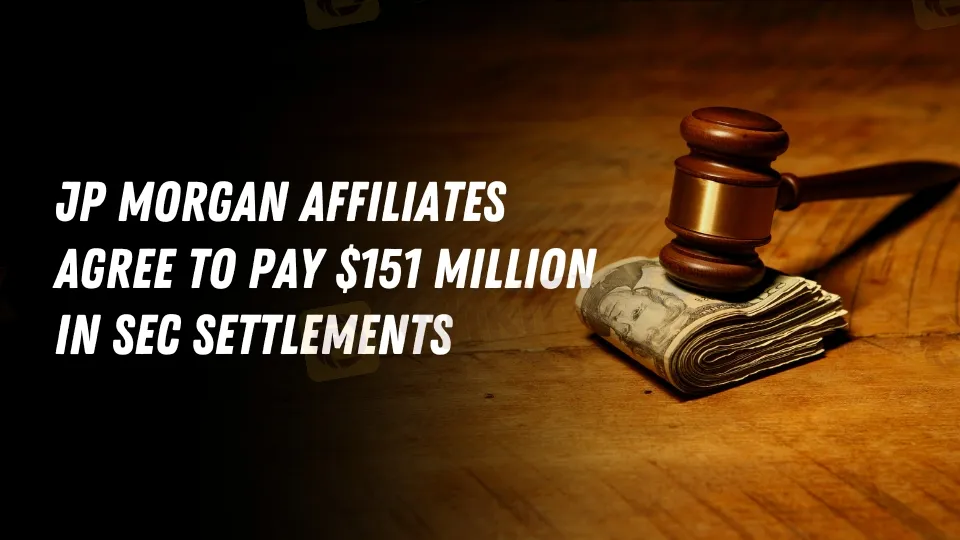简体中文
繁體中文
English
Pусский
日本語
ภาษาไทย
Tiếng Việt
Bahasa Indonesia
Español
हिन्दी
Filippiiniläinen
Français
Deutsch
Português
Türkçe
한국어
العربية
JP Morgan Affiliates Agree to Pay $151 Million in SEC Settlements
Abstract:JP Morgan faces regulatory penalties and investor reparations due to SEC findings of misleading disclosures, fiduciary breaches, and conflicts of interest.

JP Morgan Securities LLC (JPMS) and JP Morgan Investment Management Inc. (JPMIM), two affiliates of JPMorgan Chase & Co., have agreed to a $151 million settlement to address Securities and Exchange Commission (SEC) claims. The allegations, which include five different enforcement proceedings, claim a variety of crimes, such as false disclosures, breaches of fiduciary responsibility, and conflicts of interest that harmed their clients.
According to the SEC's investigation, JP Morgan affiliates failed to fulfill regulatory criteria designed to safeguard investors from the dangers of self-dealing and conflicts of interest. JP Morgan consented to large civil fines and voluntary reimbursements to investors affected by the firm's conduct, without admitting or contesting the SEC's conclusions. While fines were imposed in most instances, the SEC waived further penalties in one case in recognition of JPMS' cooperation and remedial efforts to resolve the underlying concerns.

Key Enforcement Actions and Financial Penalties
The SEC's inquiry focused on five key actions:
- Conduit Private Funds: JPMS was accused of misleading investors regarding the administration of “Conduit” private funds, which aggregated client money in private equity or hedge funds before distributing public company stock. Despite guaranteeing quick share sales, JP Morgan used discretion in scheduling, resulting in large losses for certain investors. JPMS will pay $100 million, which includes a $90 million voluntary payment to harmed customers.
- Portfolio Management Program: According to reports, from 2017 to 2024, JPMS failed to disclose financial incentives that prompted advisers to prefer JPMS's Portfolio Management Program over third-party alternatives. According to the SEC, assets in this program increased from $10.5 billion to $30 billion over the time in question. JPMS will be fined $45 million for failing to act in its clients' best interests.
- Clone Mutual Funds: Between 2020 and 2022, JPMS advised higher-cost “Clone” mutual funds over identical, more cheap exchange-traded funds (ETFs). According to the SEC's decision, JPMS and its salespeople did not account for the pricing differences while advising consumers. JPMS avoided extra fines by promptly self-reporting and paying out $15.2 million to impacted clients.
- Joint Transactions: In 2020, JPMIM banned joint transactions that benefited a foreign money market fund to the detriment of three US-based mutual funds under its supervision. JPMIM was fined $5 million and issued a cease-and-desist order as a result of this.
- Primary Trades: According to reports, JPMIM engaged in primary trades that violated SEC guidelines from 2019 to 2021, totaling more than $8 billion in transactions. These deals, carried out without the proper exemptions, resulted in conflicts of interest. JPMIM was fined $1 million for alerting the SEC of these transactions and cooperated with the investigation.
Statement from the SEC on JP Morgan's Regulatory Failures
Sanjay Wadhwa, Acting Director of the SEC's Division of Enforcement, said that JP Morgan's actions violated regulations meant to avoid conflicts of interest and safeguard investors. “With today's settlements, which include multiple self-reports and large voluntary payments to harmed investors, JP Morgan is being held accountable for its regulatory failures,” Wadhwa told the press.
Last Thoughts
JP Morgan's settlements highlight the need for transparent investing policies. The SEC's measures highlight the regulator's commitment to holding big financial firms responsible. These enforcement proceedings serve as a reminder to companies to prioritize their clients' interests and closely comply with compliance obligations. As JP Morgan progresses, their commitment to addressing and resolving these problems will be critical in regaining investor confidence and regulatory trust.

Disclaimer:
The views in this article only represent the author's personal views, and do not constitute investment advice on this platform. This platform does not guarantee the accuracy, completeness and timeliness of the information in the article, and will not be liable for any loss caused by the use of or reliance on the information in the article.
Read more

What Can Forex Traders Learn from Ne Zha?
The animated blockbuster Ne Zha: Birth of the Demon Child tells the story of Ne Zha’s journey to defy fate and take control of his own destiny. Beyond being an inspiring tale filled with action and character growth, the film conveys profound life lessons - many of which resonate deeply with the world of forex trading.

Retirement Savings Wiped Out: RM500,000 Lost to a Scammer named Richard Ong
A retiree was deceived into parting with more than RM500,000 after falling victim to an elaborate investment scam that promised substantial returns.

What Qualities of a Broker Help Professional Traders Achieve Success?
Know the key qualities of a broker that professional traders need, from fast execution to robust security and 24/7 support, to enhance trading success.

The Dark Side of Social Media Investments: How a Manager Lost RM2.08 Million
A Malaysian company manager suffered financial losses amounting to RM2.08 million after becoming the victim of an investment scam promoted through Facebook.
WikiFX Broker
Latest News
Forex Market Outlook: Key Currency Pairs and Trading Strategies for March 24–28, 2025
Singapore Police Crack Down on Scams: $1.9M Seized, 25 Arrested
Gold Prices Swing Near Record Highs
XTB Opens New Dubai Office
Africa Cybercrime Bust: Over 300 Arrested in Fraud Crackdown
The Growing Threat of Fake Emails and Phishing Scams
Hong Kong Banks and Authorities Collaborate to Freeze Fraudulent Accounts Faster
SocialFi and the Forex Market: A New Era for Decentralized Social Trading?
Is Billion Bucks Fx Scam?
BaFin Halts USDe Token Issuance, Citing Serious Compliance Failures
Currency Calculator







